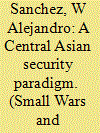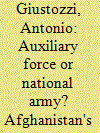| Srl | Item |
| 1 |
ID:
077140


|
|
|
|
|
| Publication |
2007.
|
| Summary/Abstract |
The Islamic Movement of Uzbekistan (IMU) is a Central Asian terrorist organization that has carried out series of attacks in countries like Uzbekistan, Kyrgyzstan and Tajikistan for years. With the ultimate goal of creating a Central Asian Caliphate, the IMU, even in its current weak state, is a regional threat. A military solution to this problem appears to be the likely answer. Regional powers like the Russian Federation and China should be militarily involved in Uzbekistan, along with Uzbek and neighboring forces in order to defeat the IMU militarily. This will promote greater integration among these countries and eliminate a violent organization which could become a destabilizing factor if not dealt with.
|
|
|
|
|
|
|
|
|
|
|
|
|
|
|
|
| 2 |
ID:
077137


|
|
|
|
|
| Publication |
2007.
|
| Summary/Abstract |
Afghanistan's fifth effort to form a central army started in 2002, following the fall of the Taleban regime. Mainly run by the US armed forces, the formation of the so-called 'Afghan National Army' run into several difficulties, ranging from initially slow recruitment, low educational level of troops and officers, high attrition rates. As the new army began to take shape, it lacked many of the characteristics which had been associated by the promoters with a 'national' army. It also showed a low level of commitment and a lax discipline. As of 2006, it looked more like an auxiliary force at the service of the US army and its allies than like a 'national' army.
|
|
|
|
|
|
|
|
|
|
|
|
|
|
|
|
| 3 |
ID:
077136


|
|
|
|
|
| Publication |
2007.
|
| Summary/Abstract |
Analytical focus on military operations in Iraq continue to overshadow analysis of the war in Afghanistan as it enters its sixth year. It is now possible to discern several clearly-delineated periods of coalition counterinsurgency and stabilization operations. What is the nature of the war and how has it evolved? Has there been success so far in Afghanistan?
|
|
|
|
|
|
|
|
|
|
|
|
|
|
|
|
| 4 |
ID:
077139


|
|
|
|
|
| Publication |
2007.
|
| Summary/Abstract |
Some scholars would have us believe that the distinctions between military and policing roles, methods and objectives have become increasingly blurred by the security demands of a post-Cold War and post-11 September global and domestic order. This article explores the current state of the police-military divide through a conceptual and case study analysis. It concludes that, in this case, there is some conflation occurring at a macro-level as international and domestic affairs have become increasingly indistinct, but the article also demonstrates that the actual ethos and practice of these agencies still differs strongly. Most importantly, the article argues that this distinction is in fact a very useful one in planning for future peace support operations
|
|
|
|
|
|
|
|
|
|
|
|
|
|
|
|
| 5 |
ID:
077141


|
|
|
|
|
| Publication |
2007.
|
| Summary/Abstract |
Peace talks have commenced between the Ugandan Government and the Lord's Resistance Army (LRA), which has committed countless atrocities during the nearly 20 years it has tried to overthrow the government. The head of the LRA, Joseph Kony, has been offered amnesty by the government in the hope that peace will ensue. This raises the question of whether a government should forego the pursuit of justice in order to prevent further bloodshed.
|
|
|
|
|
|
|
|
|
|
|
|
|
|
|
|
| 6 |
ID:
077135


|
|
|
|
|
| Publication |
2007.
|
| Summary/Abstract |
This paper examines how and why the American military helped create and exacerbate the current insurgency in Iraq and the actions it has taken since summer 2004 to address perceived operational and tactical errors. Of key importance in this process of reform were the influence of the British and their articulation of a plan which has exerted a strong influence on subsequent political and military operations within Iraq. Whilst the paper generally supports the counterinsurgency plan that is currently being implemented it identifies a series of challenges that could cause this strategic solution to unravel.
|
|
|
|
|
|
|
|
|
|
|
|
|
|
|
|
| 7 |
ID:
077138


|
|
|
|
|
| Publication |
2007.
|
| Summary/Abstract |
Perhaps surprisingly, given the availability of new Russian memoir material, some excellent individual monographs, and a large variety of declassified documents, a full operational-political account of the Soviet Union's withdrawal strategy from Afghanistan has yet to be written. This article, utilising openly published yet neglected sources, attempts to fill that gap. The final fate of the Najibullah regime, and the contradictory effect of the National Reconciliation Policy in Afghanistan itself, suggests four key lessons for international forces today as disengagement from both Iraq and Afghanistan again becomes a pressing issue, and as questions around re-creating stability within a failed state scenario again occupy the international community.
|
|
|
|
|
|
|
|
|
|
|
|
|
|
|
|